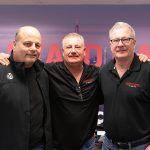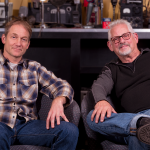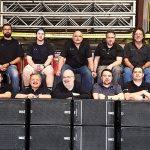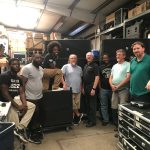Mike Goodreau deals a hot hand of audio
Mike Goodreau began his “life in sound” as a drummer, and he was also the guy smart enough to acquire the P.A. for his fledgling rock band. That happy circumstance put him on the path to a thriving career as a sound company owner and mix engineer who’s served hundreds of events over the past 20-plus years.
“After our band broke up, one of the guys asked to rent my P.A., and I proceeded to make more money from that single gig than I ever did playing the drums,” Goodreau notes. “A light bulb went on in my head, the idea was formed, and 23 years later, here I am.”
Based in Middletown, Conn. (near Hartford), Goodreau’s Ace Audio has never been the biggest sound company in the region through more than two decades of service, but over that time a lot of other audio enterprises have come and are long gone. By taking a less glamorous path of never promising a client anything that can’t be delivered, Ace Audio is now being rewarded in spades — business has never been better, ground will soon be broken on a new warehouse and shop, and there’s been an investment in a new EAW line array rig as well as other useful tools.
Goodreau is almost completely selftaught regarding all things sound, starting with some basics learned at the hand of the system tech his band hired to support their P.A. Ever since it became clear that providing audio systems, support and mixing would be his vocation, he’s made it a habit to read anything relevant he can get his hands on, and of course he’s also learned a great deal at the perpetual school of trial and error that’s the basis of any well-rounded curriculum of pro audio education.
In the early days of his fledgling enterprise, Goodreau enjoyed the close proximity of Snow Sound, one of the leading sound reinforcement providers in the region. “I guess you’d call it friendly competition. Brad Snow (company owner at that time) has always been a straight-up guy and was quite helpful,” Goodreau says. “Being a larger company, Snow got a lot of the bigger jobs, while on the smaller ones, I could be competitive on price due to less overhead. But in reality, it always seemed like we were helping each other out more than competing head to head. That’s a great way to do business.” (Snow Sound was purchased by HB Group last year and is now based in North Haven, Conn.)
The Ace Audio approach is one of being steady over the long haul, building one customer at a time and working harder at keeping that customer. Various marketing approaches through the years, including advertising in everything from cable TV to the Yellow Pages, produced very few qualified business leads.
“The only marketing that works, at least in this area, is taking the P.A. out and doing the best job every time, so that the customer is happy while other potential customers take notice and ask about our services. That’s the best way I’ve found to build sales leads,” he explains. “I remember one company here that was headed by a guy who was really slick at marketing, but his company couldn’t perform. So he’d get a lot of good gigs and invariably blow most of them, and I’d be there ready to pick up the pieces. All that I promise is that we’ll do our very best, and then make sure we exceed that.”
The shortage of qualified help (system techs and mix engineers) is regularly confronted by sound companies large and small, and its one of the biggest challenges Ace Audio has faced over the years. Count it as a primary reason Goodreau’s wife Ellen has stepped up as an invaluable system tech who can also, he adds, “move gear around with the best of them.”
His primary labor pool is a group of freelancers on call, always a fluid situation, and when someone proves their mettle and gains experience, that person invariable heads off to the greener pastures of full-time gigs at venues like the always- busy Mohegan Sun hotel and casino down the road. “I’ve probably mentored a dozen people over the years, teaching them the ropes, but it inevitably creates a Catch-22,” he says. “As a small company, it’s tough to be competitive in terms of salary and benefits, and you can’t ever blame someone for taking a better offer. But it leaves us short-handed at times in terms of qualified staffing.”
The key to retaining these folks, of course, is growing the business, and indeed, prospects in central C o n n e c t i c u t h a v e n e v e r been brighter for doing just that. Ace Audio started out primarily serving the needs of rock/pop acts, but that’s evolved, with the company now working steadily with nearby Wesleyan University as well as civic organizations, corporate clients and political fundraisers. The local jazz society is also a big client, along with a host of festivals and events like fireworks shows and “Taste Of” fairs.
“In the past 10 years the live music market here has just taken off, in addition to becoming much more diverse. Towns like Berlin, with a population of just 5,000 or so, now hosts a blues festival, and we just worked a jazz festival in Moodus, which only has about 3,000 people but apparently at least 2,500 of them came out for the show,” Goodreau says.
A n o t h e r gig, the popular Strawberry Park Bluegrass Festival in Preston, Conn., served as a milestone for Ace Audio. Marking its 29th anniversary, the annual festival features a bill of “who’s who” bluegrass artists such as Rhonda Vincent, Grammy-nominated Blue Highway and several others, and it was the first occasion the company utilized an eight-box EAW KF730 line array rig that’s joined the company inventory.
“This is an important investment, allowing us to step up in terms of the size and scope of the events we can serve,” Goodreau says. “The quandary, as always, is deciding if there’s going to be enough return on an investment, accurately projecting whether it will help us grow — and more to the point, grow profitably.
“But that’s the age-old dilemma with gear,” he continues. “A lot of us in this business spend way too much time worrying about gear rather than profitably increasing business. The two entities have to be considered together, as in, if we invest in ‘X’ component, then it will result in ‘X’ return in revenue.”
Solving problems is another factor in gear selection, pointing to another recent investment in several Crown ITech Series power amplifiers: “You get a tremendous amount of audio horsepower out of these amplifiers from a 20-amp circuit. One problem we constantly face is limited AC power at the venue, and with these amps, it’s basically a non-factor.”
Challenges like this keep Goodreau busy seven days a week during the peak of the spring/summer season, and it’s not unusual to see him mixing at most events. Despite that, the biggest focus remains educating customers about what it really takes to adequately support an event like a full-range concert for several thousand people. And it goes full circle to the primary keys to Ace Audio’s survival these many years.
“We work with clients as patiently as possible, year after year, to help them put on the best show they possibly can,” he concludes. “It’s good for their business, which in turn is good for our business, and ultimately it’s what keeps them coming back to us for more.”
GEAR
Over the years, Mike Goodreau has invested in a lot of sound reinforcement equipment. Here’s his list of favorite pieces and what he says they’ve brought to the table.
Sabine Power-Q processor. “It’s versatile, fills a lot valuable needs. The delay function makes it my “EQ of choice” for delays, the feedback eliminator works great for corporate speech-only applications, and the parametric EQ with display curve and stereo link works for quite well for FOH.”
Allen & Heath GL Series console. “I’ve been an A&H user for more than 20 years. The GL Series is a perfect match for our company, offering the right blend of features, light weight and affordability.”
EAW NT Series loudspeakers. “NT is something really special. The first time I heard these speakers, I had to have them, and my six NT boxes have stayed busy almost non-stop since they arrived.”
Audioarts 4200 parametric EQ. “This piece was acquired in the early 80s, and I love the big knobs and overall sound quality. I learned how to equalize with it, and haven’t found anything since that I like more.”
Audix OM-5 microphones. “I’ve had a set of these for seven years and have no plans to replace them. They sound so smooth, with excellent rejection, and have also held up to constant abuse without fail.”
dbx 4800 DriveRack processor. “It just does everything really well, and can run even our largest system by itself. This is my first experience in controlling a system from a PC, and I’m getting great results.”



